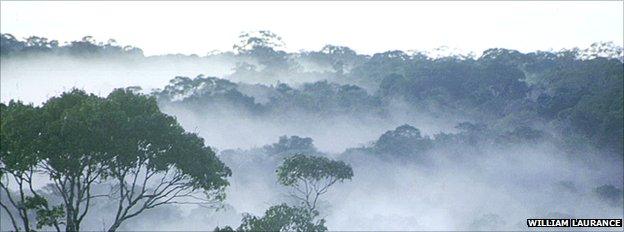'No substitute' for virgin forest
- Published

Deforestation of the Amazon basin is anything but a bright dawn for wildlife in it
The crucial role that virgin forests play in conserving nature is confirmed in a study that spans the tropics.
An international team of researchers analysed more than 100 existing studies comparing wildlife in forests that had been modified and those that had not.
Nature, notably birds, does much better in virgin tracts, they report.
The researchers conclude in the journal Nature, external: "When it comes to maintaining tropical biodiversity, there is no substitute for primary forests".
The study feeds into one of the major debates going on in environmental circles: whether it is better to exploit lots of land relatively gently, or to develop intensively in some areas and leave others as wild as possible.
"Primary forests are truly unique and have exceptional value for biodiversity," said study co-leader Luke Gibson from the National University of Singapore.
"So if you can minimise the destruction of primary forests, then that might be the best strategy for tropical biodiversity.
"And if you have to use agricultural intensification of areas that are already used for agricultural production instead of focusing more on other forms of agriculture that attempt to maintain some levels of biodiversity, such as agrofrestry, that strategy might be more effective for maintaining the highest levels of biodiversity overall," he told BBC News.
'Marked' impact
The researchers reviewed 138 studies that included 2,230 examples where biodiversity had been compared between tracts of virgin forest and areas where something had changed.

Birds fare worse than other types of organism from forest development
Those changes ranged in severity from complete clearance for agriculture, through plantations and agroforestry, to selectively logged forests where only certain types of tree had been extracted.
In all but the selectively logged areas, the impact on biodiversity was marked.
The variety of plants and animals was depleted more severely than the sheer number of organisms present.
Overall, there was one surprising finding; mammals actually do better under some kinds of forest modification, although the team warns this may be down to the fact that some animals such as rats can multiply, even as the diversity of mammals goes down.
Birds, insects and plants undergo an unequivocal loss.
The effect of losing forest emerged as particularly profound in Asian studies, compared with those in Africa and the Americas.
Although Asian deforestation has slowed markedly in recent years, this is largely being driven by an expansion in tree-planting across China - which creates modified forests rather than preserving virgin stands.
"Southeast Asia, representing most of the Asian studies, emerged as a conservation hotspot and must be one of our top priority regions," said the study's other co-leader Tien Ming Lee from the University of California in San Diego.
Sparing the land
The debate over how best to preserve nature across the tropics - where most of humanity's population growth will occur, and where the most rapid human development is taking place - compares the effects of "land-sharing" and "land-sparing".
Biodiversity glossary
In the first, farming and other development takes place in such a way that nature can share the same space.
In the second, nature gets its own entitlement, and humanity uses other bits as intensively as it likes.
Just a few weeks ago, a separate study concluded that land-sparing results in higher benefits to biodiversity and to society, with greater protection for nature and higher farm yields.
The new research is pointing in the same direction, said Simon Lewis from the UK's Leeds University, who was not involved in the study.
"It's confirming what we already knew, but in a very statistically careful and systematic way," he said.
"It fits with the idea that we should be doing more land-sparing; but one of the limitations of the study it that it doesn't look at where biodiversity will be moving in the future (under climate change).
"The places where plants and animals are appearing today are not going to be the same in 2030 or in a 100 years time, and we need to plan for that."
The biggest source of funds for forest protection in the near future may be the UN's Reducing Emissions from Deforestation and forest Degradation (Redd) initiative - and the researchers on the new paper say it will be crucial for Redd funds to prioritise the intact preservation of primary forest.
Follow Richard on Twitter, external
- Published13 September 2011
- Published2 September 2011
- Published7 July 2011
- Published25 May 2011